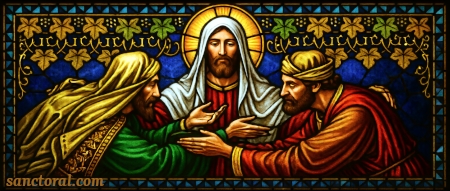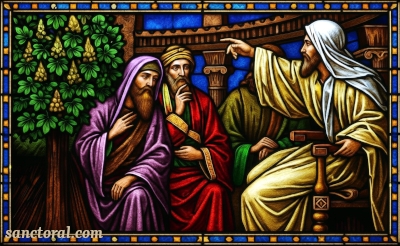It often happens that the story of Tobias, read in the divine office at about this time, furnishes the breviary lessons for to-day. Continuing our effort to discover a connexion between the missal and the breviary, it may be useful to study to-day’s Mass in the light of this account of the life of Tobias. Tobias seems to have lived in the reign of Salmanasar towards the end of the eighth century before Christ, at the time of the deportation to Assyria of the Israelites of the northern kingdom. "These and such like things,” says Holy Scripture, “did he observe when but a boy according to the Law of God. But when he was a man, he took to wife Anna of his own tribe, and had a son by her whom he called after his own name. And from his infancy he taught him to fear God and abstain from all sin. Having been carried captive into Niniveh, Tobias remembered God with all his heart, and went about looking for his fellow captives to whom he gave ‘wholesome admonitions,’ comforted them and distributed to everyone as he was able out of his goods. He fed the hungry and gave clothes to the naked, and was careful to bury the dead and those that were slain.” Later on almighty God allowed Tobias to be stricken with blindness, so that his patience, like that of holy Job, might be an example to posterity. For whereas he had always feared God from his infancy and kept his commandments, he repined not against God, because the evil of blindness had befallen him: but continued immovable in the fear of God, giving thanks to God all the days of his life. “We are,” said he, "the children of saints, and look to that life which God will give to those that never change their faith in Him.” When his wife spoke offensively about his misfortune, Tobias lamented, and began to pray with tears, using nearly the same words as those of the Introit: “Thou art just, O Lord, and all Thy judgments are just: and all Thy ways mercy and truth and judgment... And now, O Lord, deal with me according to Thy will.” Later, when giving what he thought was a final charge to his son, he said: "My son... all the days of thy life have God in thy mind and take heed thou never consent to sin. Give alms out of thy substance and turn not away thy face from any poor person. According to thy ability be merciful. See thou never do to another what thou wouldst hate to have done to thee by another.” Here we have that same precept of love to God and our neighbour, translated into practice, which is taught in the Epistle and Gospel for to-day. “Thou shalt love the Lord thy God with thy whole heart, and with thy whole soul and with thy whole mind,” and “Thou shalt love thy neighbour as thyself” (Gospel). “Walk... with all humility and mildness, with patience supporting one another in charity, careful to keep the unity of the Spirit with the bond of peace” (Epistle). When Tobias sent his son to Gabelus at Rages under the guidance of the archangel Raphael, during the journey the angel told the young man to I “draw to” him a fish that wanted to devour him, and to keep its liver as a means of driving away all kinds of devils. Again, he showed him how to take his kinswoman Sara to wife without coming to any harm at the hands of the devil who had killed her seven former husbands. "They,” said the I angel, "who in such manner receive matrimony, as to shut out God from themselves, and from their mind, and to give themselves to their lust... over them the devil hath power.” “We are children of saints,” said Tobias to Sara, “and we must not be joined together like heathen that know not God.” So they prayed earnestly both together, “to the Lord of the heavens and the earth, and the sea and the fountains, and the rivers and all creatures”, that health might be given them. And God blessed their marriage, as He had blessed that of the Patriarchs, that they might have children of the race of Abraham (Gradual). Tobias then returned home with Sara and cured his father’s blindness, whereupon the old man sang a hymn of thanksgiving, a sort of Benedictus or Magnificat in which the most magnificent Messianic prospects were disclosed. Jerusalem had been chastised for her deeds, but she would shine with a glorious light, and rejoice forever. Nations from afar should come to her, bringing gifts and adoring the Lord in her. They that despised her should be accursed, and they that blasphemed her condemned. “Blessed,” he goes on, "are all they that love thee... Happy shall I be if there shall remain of my seed to see the glory of Jerusalem. The gates of Jerusalem shall be built of sapphire and of emerald: and all the walls thereof round about of precious stones. All its streets shall be paved with white and clean stones: and Alleluia shall be sung in its streets... Furthermore the destruction of Niniveh is at hand : for the word of the Lord must be fulfilled.” Here indeed is the “new canticle” which the Gradual psalm bids us sing (v. 3 ff). "The word of the Lord is right... The Lord bringeth to nought the counsels of nations... and casteth away the counsels of princes... Blessed is... the people whom He hath chosen for His inheritance... Let Thy mercy, O Lord, be upon us, as we have hoped in Thee.” By the Jerusalem where God reigns and to which all nations come to praise the Lord is meant the kingdom of God, the heavenly Jerusalem. To her all are summoned by a universal call, to form “one body” that is the Church, a new creation (cfr Gradual), and quickened by “one Spirit ” the Holy Ghost given at Pentecost, for there exists for all but "one Lord, one faith, one baptism” (Epistle). (Saint Andrew Daily Missal with Vespers for Sundays and Feasts, by Dom Gaspar Lefebvre, O.S.B. of the Abbey of St. André, 1953) (Ps. 118:137, 124) Thou art just, O Lord, and Thy judgment is right; deal with Thy servant according to Thy mercy. Ps. Blessed are the undefiled in the way: who walk in the law of the Lord. Gloria Patri. Grant, O Lord, unto Thy people grace to avoid all contact with the devil, and with pure minds to follow Thee, the only God. Through our Lord... St. Paul reminds us that our unity of faith, baptism and hope, like that of the Holy Ghost, of Christ and the Father makes it our duty to be united in the bonds of charity, helping and consoling one another. Lesson of the Epistle of Saint Paul the Apostle to the Ephesians (4:1-6) (Ps. 32:12, 6) Blessed is the nation whose God is the Lord: the people whom He hath chosen for His inheritance. ℣. By the word of the Lord the heavens were established; and all the power of them by the spirit of his mouth. Alleluia, Alleluia. ℣. O Lord, hear my prayer; and let my cry come to Thee. Alleluia. The commandment to love our neighbour is “like to” that, by which we are bound to love God, since it is for love of Him that we love our neighbour at all. “Two-fold,” says St Augustine, "is the commandment but one is the charity.” And to enforce His teaching in the eyes of the Pharisees, our Lord gives them a proof of His Divinity in the shape of a passage quoted from David himself. We ought, therefore, to be united to Christ by faith and love. Sequel of the holy Gospel according to Matthew (22:34-46) (Saint Andrew Daily Missal with Vespers for Sundays and Feasts, by Dom Gaspar Lefebvre, O.S.B. of the Abbey of St. André, 1953)Seventeenth Sunday after Pentecost - The great Commandment

Table of Contents
Reflexions on the Liturgy of the Day
Liturgy of the Mass
Introit
Collect
Epistle
Brethren: I, a prisoner of the Lord, beseech you that you walk worthy of the vocation in which you are called. With all humility and mildness, with patience, supporting one another in charity, careful to keep the unity of the Spirit in the bond of peace. One body and one spirit, as you are called in one hope of your calling. One Lord, one faith, one baptism. One God and Father of all, who is above all, and through all, and in us all, who is blessed for ever and ever. Amen.Gradual

Gospel
At that time the Pharisees came to Jesus, and one of them, a doctor of the law, asked Him, tempting Him: Master, which is the great commandment of the law? Jesus said to him: Thou shalt love the Lord thy God with thy whole heart, and with thy whole soul and with thy whole mind. This is the greatest and the first commandment. And the second is like to this: Thou shalt love thy neighbour as thyself. On these two commandments dependeth the whole law and the prophets. And the Pharisees being gathered together, Jesus asked them, saying: What think you of Christ, whose son is He? They say to Him: David’s. He saith to them: How then doth David, in spirit, call Him Lord, saying: The Lord said to my Lord: Sit on my right hand until I make Thy enemies Thy footstool? If David then call Him Lord, how is He his son? And no man was able to answer Him a word; neither durst any man, from that day forth, ask Him any more questions. Credo